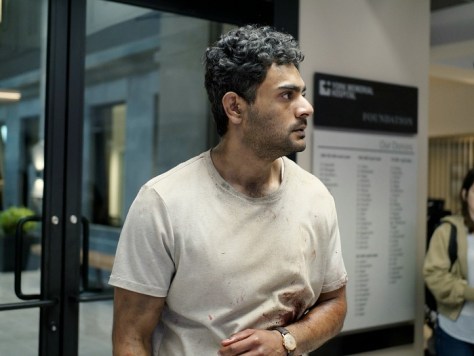It’s Canadian Screen Awards week and we’re celebrating all week long in a very special way. We’ll feature exclusive interviews with the actors and creative folks who are nominated in the television and web series categories.
Today, it’s Joseph Kay, nominated for Best Writing, Drama Series for Transplant, which is also nominated in the Best Drama Series category; and Roger Cross, nominated for 2021 Best Lead Actor, Drama Series for Coroner.
Joseph Kay, nominated for Best Writing, Drama Series for Transplant, which is also nominated in the Best Drama Series category
Congratulations on your Canadian Screen Award nominations!
Thanks so much!
How do you feel the Canadian TV industry is faring during these pandemic times?
We’ve found ways to make production work despite the restrictions. A shout out to the resiliency of our cast and crew on Transplant’s second season for working in such different ways than we were all previously accustomed. Hopefully in the coming months we hear news across our business of more and more new shows being ordered.
How have you fared during these pandemic times?
Thankfully, I’ve been able to take my pandemic angst and channel it into the writing of a medical series. Although we’re not factoring COVID into the second season of Transplant, we’ve explored themes relevant to the experience which has helped all of our creative team contemplate the way we’re feeling about the year we’ve had.
Do you think Canadian TV is stronger than ever when it comes to telling our stories?
Definitely. It’s been exciting to watch our audiences expand. And while there is still plenty more work to be done to foster this, our creative community is widening to include new voices and points of view.
Does an award nomination/win serve as validation for you or is it just a nice nod that you’re on the right track, career or choice-wise?
I’ve always said that the work is its own reward, and I have to stick to that now or I’ll have been lying all these years! But seriously, the most rewarding part for me is that, win or lose, the nominations help our whole team (cast, crew, networks) feel excited and proud of the work we’re doing together.
What will you wear during the Canadian Screen Awards?
Either a tuxedo or my pajamas. Still deciding.
What will you eat/drink/snack on during the Canadian Screen Awards?
Bourbon and chicken wings, no doubt about it.
Is there someone who served as a mentor when you were starting out in this industry that you’d give a special shout-out to in your acceptance speech if given the chance?
My first mentor in this industry was George F. Walker and I’d be thrilled to get the chance to give him a shout out!
Roger Cross, nominated for 2021 Best Lead Actor, Drama Series for Coroner
How do you feel the Canadian TV industry is faring during these pandemic times?
The Canadian TV industry seems to have recovered and is thriving since the pandemic began.
How have you fared during these pandemic times?
Like most, the first few months were a bit uncertain, but I was blessed to spend that quality time with my family! And we’ve since filmed Season 3 of Coroner. I’m currently finishing a feature film Heatwave, I’m about to go shoot A Christmas Letter with my friend David Lipper, then film a great indie film Uniting with a wonderful cast. So, I’ve been blessed during this time.
Do you think Canadian TV is stronger than ever when it comes to telling our stories?
Most definitely. Schitt’s Creek is definitely leading the way, and shows like ours are also making great headway in the U.S. and around the world.
Does an award nomination/win serve as validation for you or is it just a nice nod that you’re on the right track, career or choice-wise?
I think true validation only comes from within. But of course, this nomination is an honour, and it feels great to be recognized by your peers and the Canadian Academy!
What will you wear during the Canadian Screen Awards?
Hmmmmm….Tux up top, boxers down below.
What will you eat/drink/snack on during the Canadian Screen Awards?
Pizza and beer. Maybe a glass of wine as well.
Is there someone who served as a mentor when you were starting out in this industry that you’d give a special shout-out to in your acceptance speech if given the chance?
Though I’ve never met the man, Sidney Poitier is someone I’ve always looked up to and admired. The dignity and joy with which he carried himself and the kind of roles he chose to do during such troubling times, spoke volumes to me.
Stream the Canadian Screen Awards on the Academy website, Twitter and YouTube.
Check out the list of nominees.
Tuesday, May 18, 2021
7 p.m. ET: Canadian Screen Awards – Children’s & Animation, Presented by Shaw Rocket Fund (Narrator: Eric Bauza)
8 p.m. ET: Canadian Screen Awards – Digital & Immersive, Presented with the participation of the Independent Production Fund (Narrator: Donté Colley)
Wednesday, May 19, 2021
7 p.m. ET: CTV presents the Canadian Screen Awards – Creative Arts & Performance (Narrator: Tyrone Edwards)
Thursday, May 20, 2021
7 p.m. ET: Canadian Screen Awards – Cinematic Arts, Presented by Telefilm Canada, Supported by Cineplex (Narrator: Nahéma Ricci)
8 p.m. ET: 2021 Canadian Screen Awards (Narrators: Stephan James and Karine Vanasse)














